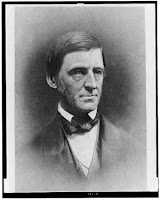The Kilowatt Hour
Tuesday, March 31, 2020
Tuesday, February 25, 2020
Be your self
To be yourself in a world that is constantly trying to make you something else is the greatest accomplishment. - Ralph Waldo Emerson, American Essayist
 |
| Ralph Waldo Emerson 1803 - 1882 |
Sunday, January 19, 2020
Challenges
Challenges are what make life interesting and overcoming them is what makes life meaningful.
Wednesday, January 8, 2020
Daily quote. Jan 8 2020
Accept responsibility for your life. Know that it is you who will get you where you want to go, no one else. -Les Brown
Saturday, February 26, 2011
Energy Generation in the United States
Today, most of the energy consumed in the United States comes from fossil fuels — coal, petroleum, and natural gas, with crude oil-based petroleum as the dominant source of energy. Renewable energy resources supply a relatively small but steady portion, about 8% of U.S. total energy consumption. In the late 1950s, nuclear fuel began to be used to generate electricity, and in recent years has surpassed renewable energy sources.
The use of energy fuels has changed over time, but the change tends to occur slowly. In the long view of U.S. history, wood, a renewable energy source, served as the preeminent form of energy for about half of the Nation’s history. Coal surpassed wood’s usage in the late 19th century, and was, in turn, overtaken by petroleum products in the mid 1900s. Natural gas consumption experienced rapid growth in the second half of the 20th century, and coal use also began to expand as the primary source of electric power generation.
Sources: U.S. Energy Information Administration
The use of energy fuels has changed over time, but the change tends to occur slowly. In the long view of U.S. history, wood, a renewable energy source, served as the preeminent form of energy for about half of the Nation’s history. Coal surpassed wood’s usage in the late 19th century, and was, in turn, overtaken by petroleum products in the mid 1900s. Natural gas consumption experienced rapid growth in the second half of the 20th century, and coal use also began to expand as the primary source of electric power generation.
Sources: U.S. Energy Information Administration
Energy measurements
The standard unit of energy in the International System of Units (SI) is the joule (J), equal to one watt second. One kilowatt hour is 3.6 megajoules.
The kilowatt hour is standard unit of measurement for electrical energy delivered to consumers by electric retailers.
A "British thermal unit" (Btu) is a measure of the heat content of fuels. It is the quantity of heat required to raise the temperature of 1 pound of liquid water by 1°F at the temperature that water has its greatest density (approximately 39°F).
One practical way to compare different fuels is to convert physical units of measure (such as weight or volume) into a common unit of measurement based on the energy content of each fuel. The British thermal unit (Btu) is a widely used measure of energy content. Popular physical units of measurement that are converted to Btu are; barrels of oil equivalent, metric tons of oil equivalent, and metric tons of coal equivalent.
It takes between 7,000 to 11,500 Btu of primary fuel to generate a kilowatt hour in a fossil fuel fired power plants. The number of BTUs of heat required to produce a kilowatt-hour of energy in a power plant is referred to as the heat rate of the power plant. For more information on heat rates see this report:
Subscribe to:
Posts (Atom)
